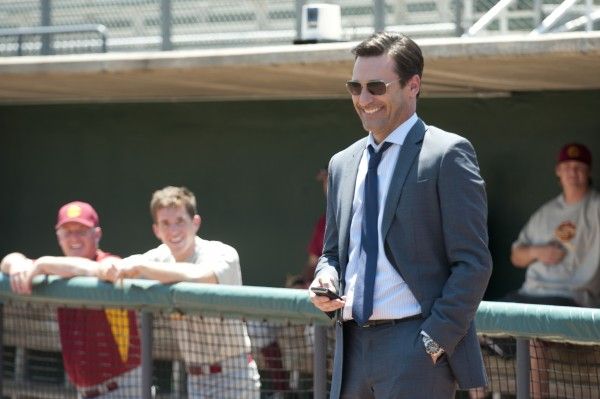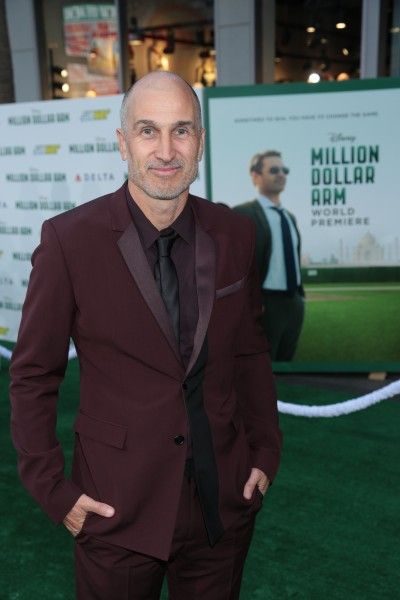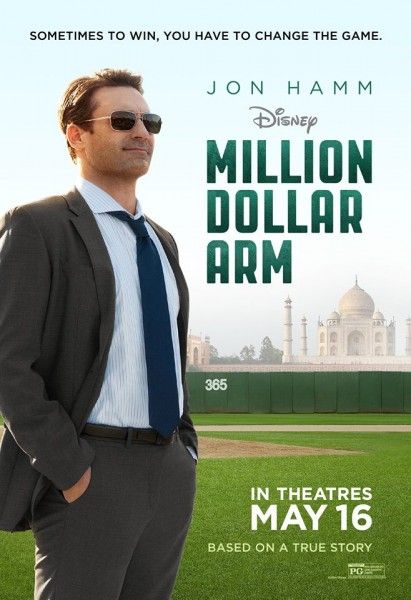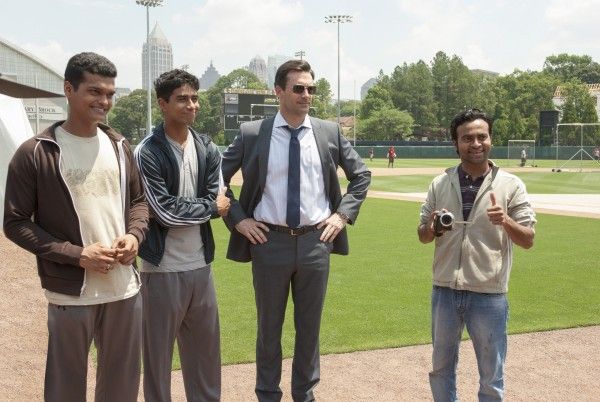Based on an incredibly inspiring true story, Million Dollar Arm is so much more than just a sports film. It tells the story of sports agent JB Bernstein (Jon Hamm), who comes up with a scheme to save his career by finding the next Major League Baseball star among the totally raw and untapped talent in India. Once there, he finds two 18-year-old boys, Rinku (Suraj Sharma) and Dinesh (Madhur Mittal), whose knack for throwing a fastball could quite possibly lead them straight to a major league contract.
At the film’s press day, director Craig Gillespie spoke to Collider for this exclusive interview about why he was drawn to this project, how critical it was to cast someone like Jon Hamm, finding the perfect Rinku and Dinesh, the importance of streamlining a film that has so much going on, that the first cut was about 40 minutes longer, what it was like to shoot somewhere as chaotic as India, and how he’ll pick his next project. Check out what he had to say after the jump.
Collider: Was part of the attraction to this project the fact that you’d get to make a really inspiring family film?
CRAIG GILLESPIE: I do tend to keep finding myself in this territory a little bit, but it was Tom McCarthy’s writing. He has this dance that he does between the humor and the drama and the emotion, and it’s such a tricky thing to be able to pull off. When I read it on the page and I identify it, I just want to do everything I can to be able to film it. It’s happened in the past with (Lars and the Real Girl screenwriter) Nancy Oliver and (United States of Tara creator) Diablo [Cody], and I’ve always loved Tom’s writing, so that’s what caught me, at first.
How critical was the casting for this, and to get Jon Hamm as the film’s lead?
GILLESPIE: It’s critical. I can’t make that magic happen. It all honestly comes down to the actors and their DNA, and if they can bring those words to life and do that dance. Jon has done some incredibly dramatic performances, and he’s done these very broad comedies, like Bridesmaids and Saturday Night Live. So, I knew he had the chops for it. He’s just never had the opportunity to walk that line. I was just so excited that we got him. This is the first time he’s been able to do that dance, and he was fantastic. Lake [Bell] was really a tough casting, trying to figure out who would be able to stand up to Jon. He’s not likeable for most of the film. That’s a talent, as an actor. And she doesn’t put up with anything and really holds him accountable, but she does it with this light touch and a sense of humor. And there was a plausibility that he didn’t notice her, at the beginning of the film. She had to be so down-to-earth, but firm and strong. Jon is such a man, in the best sense, that he can be a formidable presence to go up against, and she made it effortless and really put him in his place. I was thrilled when we found her, but that was a tough piece of the puzzle.
How challenging was it to find your Rinku and Dinesh?
GILLESPIE: I had fallen in love with Suraj [Sharma] from Life of Pi. As we were working on the characters, we really wanted to differentiate Rinku and Dinesh. We felt that there was this theme going on with the boys, as we were delving deeper into the characters, and we pushed that a little more. Rinku didn’t respond to pressure and he had this playfulness about him, and I really saw that in Suraj’s performance in Life of Pi. I was thrilled when we managed to get him. But then, we had to find his counterpart in Dinesh. We saw a lot of boys in India. We really wanted our cast to be from India, which Suraj is. We only really looked in India. I narrowed it down to five guys who I thought were great actors, and then we put them all in a room with Suraj. Madhur [Mittal] just popped, with the energy between the two of them. He’s got the weight of the world on his shoulders, and this loneliness. It was immediately apparent that those two, together, were great. It was such a relief. We were like, “We found it. We’re good.” It was amazing. It was really one of those startling moments that you see with actors. The other guys were great, but you’ve gotta find that chemistry between the actors, and with these guys, it was just there.
With so much going on in this movie, so many characters and storylines, and with some of it taking place in India, did you have to cut the film down quite a bit?
GILLESPIE: There are definitely scenes that aren’t in the film, but nothing major. It’s always about condensing it and streamlining it. Obviously, Jon is the foundation of the journey. He’s really the guy that goes through the most growth, so we had to really track his story. With the boys, they just want to win the contest. It’s not as much of an arc for them. They’re more of the catalyst that changes Jon. So, there was a lot of story in it, but it was really about streamlining it. It was a thick script. It was 135 pages, when we started. You just go through a scene and you go, “We don’t need this line. We don’t need that line. Let’s come in here, and let’s get out here.” I’ve worked with the same editor for three movies now, who I love. She’s great. She helps, enormously.
How long was your first cut of the film?
GILLESPIE: The first assembly was probably 40 minutes longer. But that’s not uncommon, in the film world. You’re in the range with that. If it was three-and-a-half hours, you’d be like, “Where do we start?”
What was it like to shoot in India?
GILLESPIE: I talked to a bunch of DPs that I’m friends with, that have shot there, and they always just chuckled when I said, “We’re going to India.” That’s what prepared me. Because of the places that we were trying to shoot in, in old Mumbai, there were just thousands of people on the street. When you’re a film crew that turns up, people just come out of the woodwork. You’re just gonna get mobbed. You don’t have lock-up or any kind of crowd control, for the most part, so you just have to go with that chaos. In a lot of ways, I knew that going into it, so it was exhilarating. There were always things going on. You’d be in the middle of a shot and, all of a sudden, the truck is moving because some local guys told them to move it. If you actually stop to think about it, it’s insane, so you just don’t stop.
Did you plan everything out very specifically, before you went there?
GILLESPIE: No. The thing that was planned was that we needed to shoot this shot at 8:45 in the morning because that’s when the light would be good. There’s a steadi-cam shot with Jon and Darshan [Jariwala] walking down the street, and it was a crazy thing to do with no police and no lock-up on a live street. You see the thousands of people there, and they’re not extras. They’re just people in the streets. Everybody is talking and everybody is trying to block things out, but eventually you just yell, “Action!,” everybody starts moving, the camera starts going, and you get a take. If you actually stop and look at it, you’ll see hundreds of people just looking at the camera, but it looks like they’re just watching Jon walk by because he’s the one white person on the whole street.
How are you going to follow this film up?
GILLESPIE: It’s always the material. I know it’s bizarre. There’s no straight line for what I’m doing. I’m lucky that I’ve gotten projects that I’m interested in. I have no idea what I’m going to do next, and then I’ll read something that just sticks with me. I read it and I see the film as I read it, and then my life is a lot easier, in terms of getting involved. So, we’ll see.
It seems like it took you some time to get your next project going, after Fright Night. Are you just selective and picky about the projects that you do, or did the delays with Pride and Prejudice and Zombies, and then having that not happen, make the gap between films longer than you would have liked?
GILLESPIE: I loved the script for Pride and Prejudice and Zombies, and it was another situation where it was a mix of tones. I don’t know why I keep finding myself attracted to that, but it’s probably because I love it in other filmmakers, as well. When you get into a situation, as an audience member, where you’re watching the movie and it has these dual tones going on, the audience has to decide what they think is funny or not funny. They’re much more active with it. You’ll get people that are tearing up in a scene and other people that are laughing, but neither is a wrong response. I’m not telling them, “Here’s the punchline.”
Million Dollar Arm opens in theaters on May 16th.




